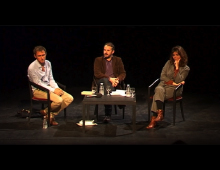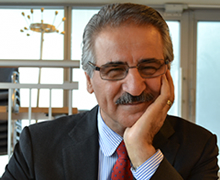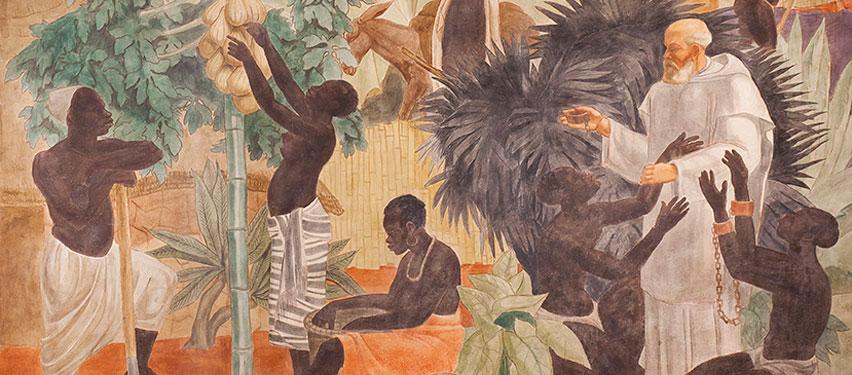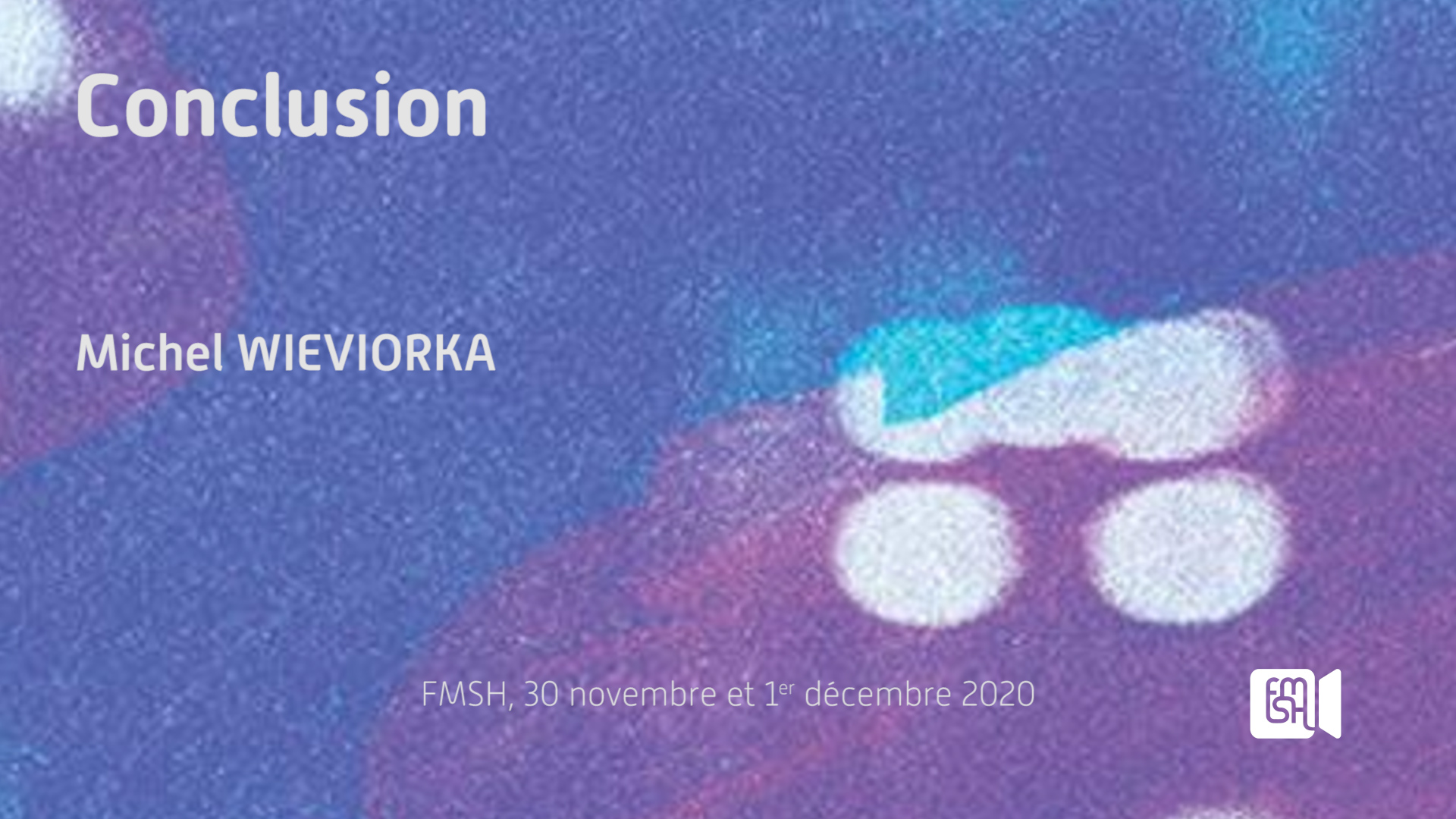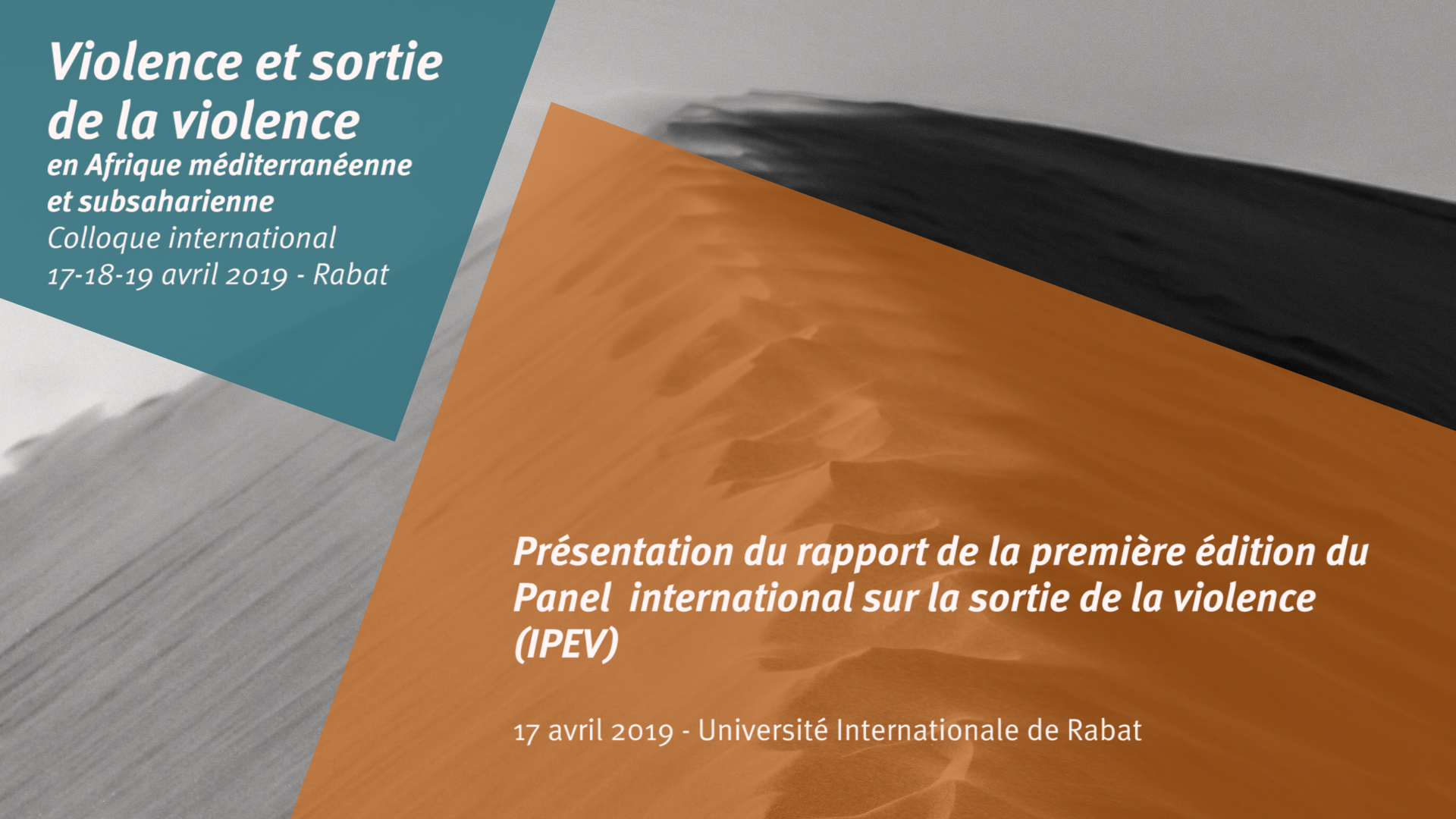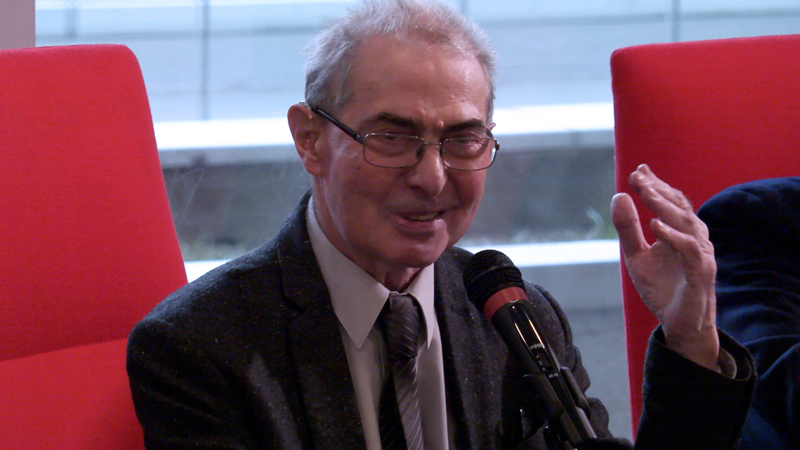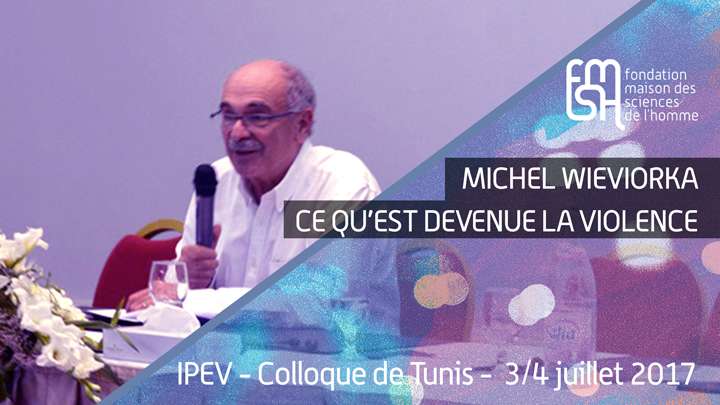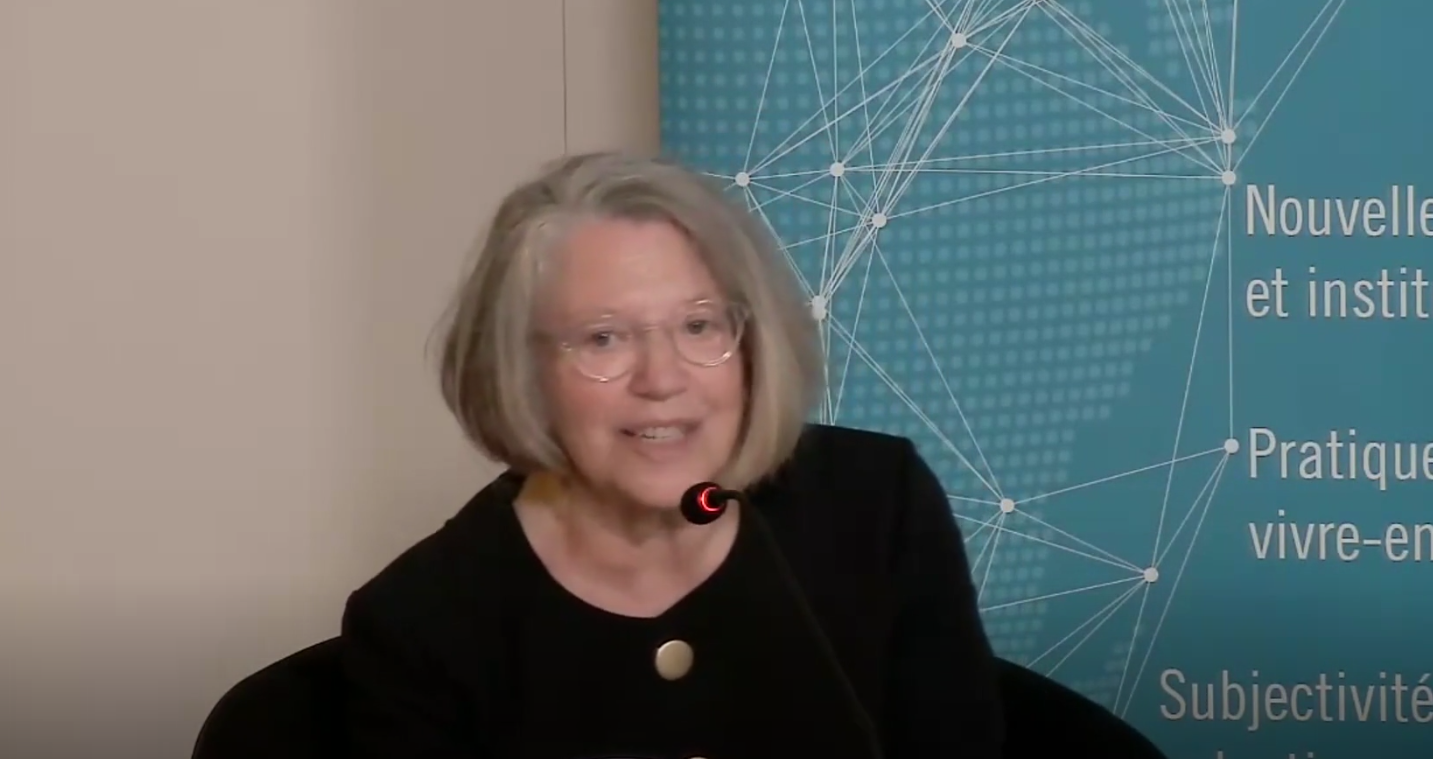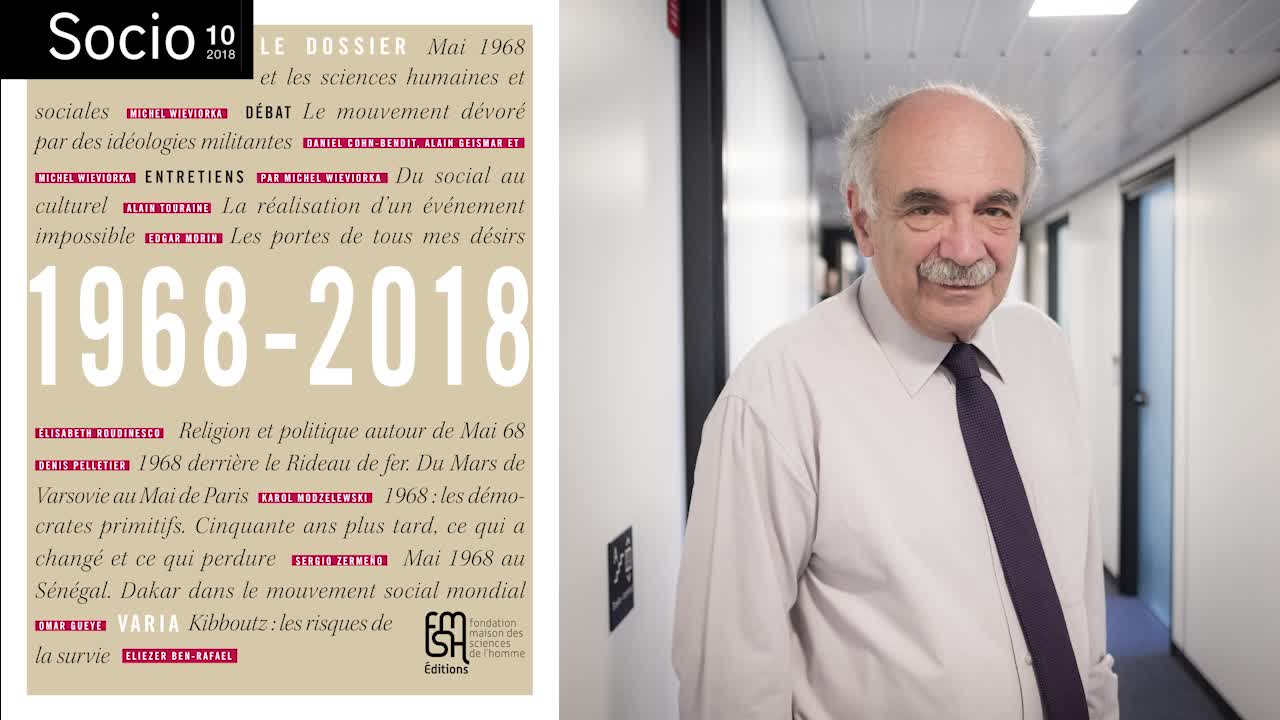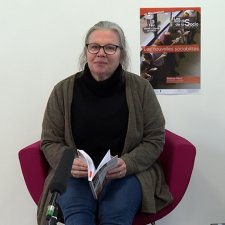Chapitres
- Conférence de Roger Waldinger60'43"
- Remarques de Michel Wieviorka03'51"
- Remarques de Hervé Le Bras06'19"
- Réponses aux remarques09'54"
- Discussion06'12"
Notice
Du transnationalisme par Roger Waldinger
- document 1 document 2 document 3
- niveau 1 niveau 2 niveau 3
Descriptif
Du transnationalisme
Séminaire général avec Roger WALDINGER, dans le cadre du séminaire de Michel Wieviorka et Hervé Le Bras : "Sociologie du conflit".
Le vocabulaire des sciences sociales est trop souvent mêlé à celui de la vie quotidienne pour qu'il soit possible de disposer de catégories précises relatives aux grands problèmes du monde contemporain. Ainsi des mots comme peuple, race, laïcité, crise, mouvement social, etc. se rencontrent aussi bien dans le débat public que dans les publications scientifiques. Le séminaire poursuivra son enquête sur les mots et les catégories des sciences sociales en articulant la réflexion abstraite à l'examen de problèmes concrets. Il s'interrogera à nouveaux frais sur la notion d'universalisme et le sens qu'elle peut revêtir dans un univers globalisé. Elle réfléchira également sur l'articulation des disciplines des sciences humaines et sociales ou sur la place du numérique dans leur évolution.
>> En savoir plus sur le séminaire : http://www.fmsh.fr/fr/c/4154
Roger WALDINGER, Professor (Ph.D. Harvard) works on international migration: its social, political, and economic consequences; the policies and politics emerging in response to its advent; the links between immigrants and the countries and people they have left behind. He is the author of over 100 articles and book chapters and seven books, including Still the Promised City? New Immigrants and African-Americans in Post-Industrial New York (Cambridge, MA: Harvard University Press, 1996) and Ethnic Los Angeles (edited with Mehdi Bozorgmehr, New York: Russell Sage Foundation Press, 1996), both winners of scholarly prizes.
Waldinger’s latest book, The Cross-Border Connection: Immigrants, Emigrants, and their Homelands, will be published by Harvard University Press in 2015. The Cross-Border Connection addresses a paradox at the core of the migratory phenomenon: emigrants departing one society become immigrants in another, tying those two societies together. With book, Waldinger explains how interconnections between place of origin and destination are built and maintained and why they eventually fall apart. Newcomers to the developed world find that migration is a good thing and they send some of these benefits back to relatives as remittances. Residing in a democratic state, emigrants mobilize to produce change in the homelands they left, while emigration states extend their influence across boundaries to protect nationals and retain their loyalty. Time, however, proves corrosive, and most immigrants and their descendants become disconnected from their place of origin, reorienting their concerns to their new home.
Intervention / Responsable scientifique
Dans la même collection
-
6e séance du séminaire-cycle de rencontres "Fiction littéraire contre Storytelling: formes, valeurs…
BertinaArnoGefenAlexandreKerangalMaylis deUniversitaire (Paris-Sorbonne/CNRS) et critique littéraire, Alexandre Gefen travaille sur la biofiction (dernière publication : l’anthologie Vies imaginaires. De Plutarque à Michon, Gallimard, « Folio
-
Rencontre avec Mala Bakhtyar : Le gouvernement kurde et les changements sociaux
TouraineAlainBataillePhilippeWieviorkaMichelBakawanAdelBakhtyarMalaFoucherMichelJolyDanièleLa Fondation Maison des sciences de l'Homme et le CADIS ont accueilli le vendredi 20 juin 2014 Monsieur Mala BAKHTYAR, pour une rencontre avec des intellectuels et des chercheurs français, suivie du
Avec les mêmes intervenants et intervenantes
-
Exposer le racisme et l’antisémitisme - Séance introductive
NdiayePapWieviorkaMichelColloque | 6 mai Le Musée national de l’histoire de l’immigration et la Plateforme internationale sur le Racisme et l'Antisémitisme PIRA (FMSH,EPHE) vous proposent un colloque
-
Conclusion du Colloque international « Sortir de la violence », par Michel Wieviorka
WieviorkaMichelCe colloque international a présenté les principaux résultats scientifiques du programme SoV – Sortir de la violence (2017-2021), réalisé avec le soutien de l’Agence nationale de la recherche
-
Sortie de la revue Violence - Interview de Michel Wieviorka et Scott Straus
WieviorkaMichelStrausScottInterview de Michel Wieviorka et Scott Straus dans le cadre du lancement de la revue Violence.
-
Immanuel Wallerstein : comprendre le monde — et le changer
WieviorkaMichelBoyerRobertAymardMauriceHugotYves DavidL’Association des Amis de la FMSH, en partenariat avec la Fondation Maison des sciences de l'homme, a organisé le 26 novembre 2019, une rencontre autour de l’apport d’Immanuel Wallerstein, figure
-
Introduction et présentation du rapport IPEV 1 - Colloque international Rabat 2019
DozonJean-PierreWieviorkaMichelFerretJérômeThomasDominiqueStrausScottColloque international Violence et sortie de la violence en Afrique méditerranéenne et subsaharienne FMSH – UIR (Chaire CSFR)
-
Rencontre avec Karol Modzelewski
TouraineAlainWieviorkaMichelMinkGeorgesModzelewskiKarolÀ l'occasion de la sortie de ses mémoires en français Nous avons fait galoper l'Histoire. Confessions d'un cavalier usé, Karol Modzelewski sera présent à Paris pour présenter et signer son ouvrage
-
« MIGRATION » OF SCHOLARS AT RISK, WHAT PERSPECTIVES OF COOPERATION FOR THE PHILANTHROPIC SECTOR?
WieviorkaMichelProcoliAngelaLaborierPascaleLohéacLauraWorkshop - 2019 EFC conference The Fondation Maison des sciences de l’homme and the Pause Program organize a discussion on « Migration » of scholars at risk, what perspectives of
-
JACQUES SÉMELIN | CONFÉRENCE AUTOUR DE SON DERNIER OUVRAGE LA SURVIE DES JUIFS EN FRANCE. 1940-1944
WieviorkaMichelSemelinJacquesCette conférence est une séance délocalisée du séminaire de la Plateforme Violence et sortie de la violence de l’ANR SoV, organisé en collaboration avec la MSHS-T dans le cadre de l’ANR SoV. 06
-
ANALYSE DU MOUVEMENT DES GILETS JAUNES
WieviorkaMichelKhosrokhavarFarhadLe BrasHervéSéminaire - Mercredi 5 décembre Cette séance du séminaire Sociologie du conflit sera consacrée à l'analyse du mouvement des gilets jaunes par Hervé Le Bras et Michel
-
Michel Wieviorka - Ce qu’est devenue la violence - IPEV - Colloque de Tunis
WieviorkaMichelConférence de Michel Wieviorka Colloque de Tunis du 3-4 Juillet 2017 Le Panel International sur la Sortie de la Violence s’est réuni à Tunis le 3 et 4 Juillet 2017. Le colloque s’est déroulé en
-
Redistribution, reconnaissance et crise d'hégémonie : du néolibéralisme progressif à Trump ... et a…
WieviorkaMichelFraserNancySociologie du conflit avec Nancy Fraser - Mercredi 23 mai Séance du séminaire Sociologie du conflit de Michel Wieviorka et Hervé Le Bras avec comme invitée Nancy Fraser, titulaire
-
Socio 10 : 1968-2018 (revue)
WieviorkaMichelMichel Wieviorka dirige la revue Socio. Le numéro 10 1968-2018 est paru en mars 2018 aux Editions de la FMSH. Il nous parle de ce numéro. Podcast (à écouter) Préparé par Michel Wieviorka, le dossier
Sur le même thème
-
Les nouvelles sociabilités
MilardBéatriceAssiste-t-on à une perte ou un renouveau des sociabilités dans nos sociétés ? Internet et les dispositifs de mise en relation (notamment les nombreux médias sociaux) ont-ils renforcé la sociabilité
-
comment les historiens affrontent la violence du 20ème siècle
Comment les historiens affrontent la violence du 20ème siècle Conférence d’Henry Laurens, Professeur d’histoire contemporaine du monde arabe au Collège de France, organisée avec le soutien de l'IEA de
-
Mutantes/vampires, autour des oeuvres de Virginie Despentes et Paul Beatriz Preciado 5/22 - Table r…
Ce colloque entend dresser un bilan scientifique de l’apport de Virginie Despentes et de Paul Beatriz Preciado à la littérature et aux pensées féministes. En dépit de la popularité de ces auteur.e.s,
-
Mutantes/vampires, autour des oeuvres de Virginie Despentes et Paul Beatriz Preciado 13/22 - Confér…
Ce colloque entend dresser un bilan scientifique de l’apport de Virginie Despentes et de Paul Beatriz Preciado à la littérature et aux pensées féministes. En dépit de la popularité de ces auteur.e.s,
-
Mutantes/vampires, autour des oeuvres de Virginie Despentes et Paul Beatriz Preciado 22/22 - Fin du…
Ce colloque entend dresser un bilan scientifique de l’apport de Virginie Despentes et de Paul Beatriz Preciado à la littérature et aux pensées féministes. En dépit de la popularité de ces auteur.e.s,
-
Mutantes/vampires, autour des oeuvres de Virginie Despentes et Paul Beatriz Preciado 8/22 - Adaptat…
Ce colloque entend dresser un bilan scientifique de l’apport de Virginie Despentes et de Paul Beatriz Preciado à la littérature et aux pensées féministes. En dépit de la popularité de ces auteur.e.s,
-
Mutantes/vampires, autour des oeuvres de Virginie Despentes et Paul Beatriz Preciado 17/22 - Table …
Ce colloque entend dresser un bilan scientifique de l’apport de Virginie Despentes et de Paul Beatriz Preciado à la littérature et aux pensées féministes. En dépit de la popularité de ces auteur.e.s,
-
Mutantes/vampires, autour des oeuvres de Virginie Despentes et Paul Beatriz Preciado 3/22 - Virgini…
Ce colloque entend dresser un bilan scientifique de l’apport de Virginie Despentes et de Paul Beatriz Preciado à la littérature et aux pensées féministes. En dépit de la popularité de ces auteur.e.s,
-
Mutantes/vampires, autour des oeuvres de Virginie Despentes et Paul Beatriz Preciado 11/22 - Table …
Ce colloque entend dresser un bilan scientifique de l’apport de Virginie Despentes et de Paul Beatriz Preciado à la littérature et aux pensées féministes. En dépit de la popularité de ces auteur.e.s,
-
Mutantes/vampires, autour des oeuvres de Virginie Despentes et Paul Beatriz Preciado 20/22 - Manife…
Ce colloque entend dresser un bilan scientifique de l’apport de Virginie Despentes et de Paul Beatriz Preciado à la littérature et aux pensées féministes. En dépit de la popularité de ces auteur.e.s,
-
Mutantes/vampires, autour des oeuvres de Virginie Despentes et Paul Beatriz Preciado 6/22 - Interve…
Ce colloque entend dresser un bilan scientifique de l’apport de Virginie Despentes et de Paul Beatriz Preciado à la littérature et aux pensées féministes. En dépit de la popularité de ces auteur.e.s,
-
Mutantes/vampires, autour des oeuvres de Virginie Despentes et Paul Beatriz Preciado 14/22 - Paul B…
Ce colloque entend dresser un bilan scientifique de l’apport de Virginie Despentes et de Paul Beatriz Preciado à la littérature et aux pensées féministes. En dépit de la popularité de ces auteur.e.s,




